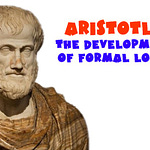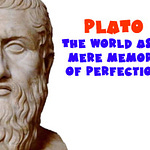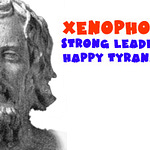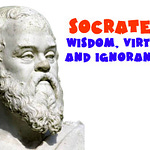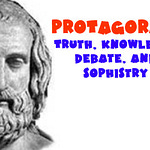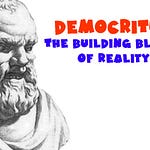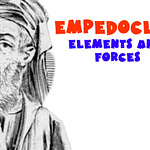Paid subscribers will have access to this and all other videos and bonus content. Please consider upgrading to a paid subscription to enjoy and support this project.
You can also obtain the benefits of a paid subscription by sharing Three Minute Philosophy with others. For each new friend you bring in, you earn benefits. So spread the word!
For the full archive of videos so far, visit https://www.speterdavis.com/philosophy/
Pherecydes of Syros was a Greek philosopher who lived around 600 BC, and some consider him to be an underrated figure in the history of western philosophy and maybe even a better candidate than Thales for the title of the first philosopher.
You won’t find much mention of Pherecydes in the traditional history of philosophy, and it’s been argued that this is because his ideas didn’t fit the narrative of what western philosophy is supposed to be.
The Ionian school were materialists who departed from religious explanations for the world around them and instead tried to explain things through physical processes.
Pherecydes was much less literal and although he was concerned about describing the world and its origins the way he went about it was less rigorous and scientific.
It was much closer to what we might think of as occult mysticism.
For instance, instead of discussing first principles as material substances like water or air, Pherecydes used mythic representation.
His first principles were Zas, Chronos and Chthoniê.
These weren’t material concepts but they weren’t exactly gods, either. They were spiritual concepts, kind of like a modern spiritualist might talk about mother Earth, or chi, or auras.
Pherecydes wasn’t exactly writing about the religion of the ancient Greeks in the way that Homer and Hesiod were, nor was he critiquing it like Xenophanes.
But rather he used these ideas as a kind of template for describing the origins of the universe in a way that might have been easier to digest, using words and mythologies that people were already familiar with.
In that sense Pherecydes is often considered a bridge between mythology and western philosophy.
This makes him controversial in studies of western philosophy because it just doesn’t seem very western.
Indeed, Pherecydes philosophy in many respects seems to be heavily influenced by Zoroastrianism, the religion of the Persians.
Zoroastra or Zarathustra, was a Persian prophet who lived in the region of what is now Iran somewhere between 700 and 2000 BC.
We’re not exactly sure because so much of the ancient Persian history was passed down verbally and when it was finally written down most of it was destroyed by Alexander the Great.
Thanks Alex.
But in any case the cosmology of Pherecydes seems to have borrowed a lot of Zoroastrian tradition, as well as maybe some from the Akkadians from ancient Iraq, and merged it with he Greek religion to develop a unique creation myth.
Zas took its name from the Greek god Zeus, and it was the essence or deity of the sky, whereas his wife, Chthonie, was the Earth.
The concept of the world being created by a union between a sky god and an earth god was pretty typical in western creation narratives, but where Pherecydes jammed a big eastern spanner into the works was his addition of Chronis – the deity of time.
In fact, Pherecydes was the first western philosopher to really think about time.
Of course people did think about time, it was very important for food production and industry to have an understanding of hours and days and years and seasons.
But nobody really thought about time as a thing that exists in the world, unlike other things which are material and can be seen and touched.
According to the traditional Greek point of view it was just sort of a property of the world.
The idea of time being an actual element or building block of reality was something much more typical of the Zoroastrians.
Considering that Persia wasn’t very far to the east of Miletus where Greek philosophy was born, it’s easy to imagine Pherecydes in his travels learning about their philosophy and borrowing elements of it.
Their idea of time, in particular, might have been a proverbial eureka moment for him as it s the missing link in his cosmology, like discovering the Higgs boson or something.
In Pherecydes mythology Zas, Chonos and Chthonie are the parents of all reality, and it was very unusual for a creation myth back then to have three deities less like a traditional marriage and more like a polycule or a throuple.
Zas was also the first example of a sky god being portrayed as a creator or craftsman rather than just a king sitting on a mountain throwing lightning bolts like his namesake Zeus.
Zas therefore was the creator force from the sky who acted upon his wife Chthonie, the world, but they acted through Chronos, which is time, and that’s where we get words like chronology from.
Chronos then gave birth to everything in the world, just like time does, metaphorically.
You can decide for yourself whether all this sort of thing actually counts as philosophy or not, or whether it’s all just a bunch of weird stuff some guy said, but it is still notable that Pherecydes does not appear in most histories of philosophy.
The timeline of philosophy that’s dictated mainly by 20th century European figures such as Bertrand Russell prefers to draw one direct line starting from the Ionaian materialists, because those who sharply distinguish western philosophy from eastern find it a little unpalatable to think maybe it all started in Mesopotamia rather than Greece.
But some other philosophy historians think that it actually all evolved through Pherecydes because when you look at the history of Greek philosophy before Socrates a lot of it looked more occult than academic.
Especially when it comes to Pherecydes’ most famous student, a guy named Pythagoras. That’s what I call foreshadowing.
Sources:
Schibli, Hermann S., Pherekydes of Syros. Clarendon Press, Oxford, 1990.
Toye, D.L., Pherecydes of Syros: Ancient Theologian and Genealogist. Mnemosyne: Fourth Series, Vol. 50, Fasc. 5 (Oct., 1997), pp. 530-560.
Yong, Peter., Pherecydes of Syros and the Occult Roots of Philosophy. Premier État Philosophy. YouTube, 2024. http://www.youtube.com/watch?v=zps-BnopB2A
What you get for subscribing:
Three Minute Philosophy is a fun and educational series of videos and essays about the history of philosophy.
Essays are free. Paid subscribers will gain access to full videos, printable PDFs, and possibly more in time.
Listen to this episode with a 7-day free trial
Subscribe to Three Minute Philosophy to listen to this post and get 7 days of free access to the full post archives.






